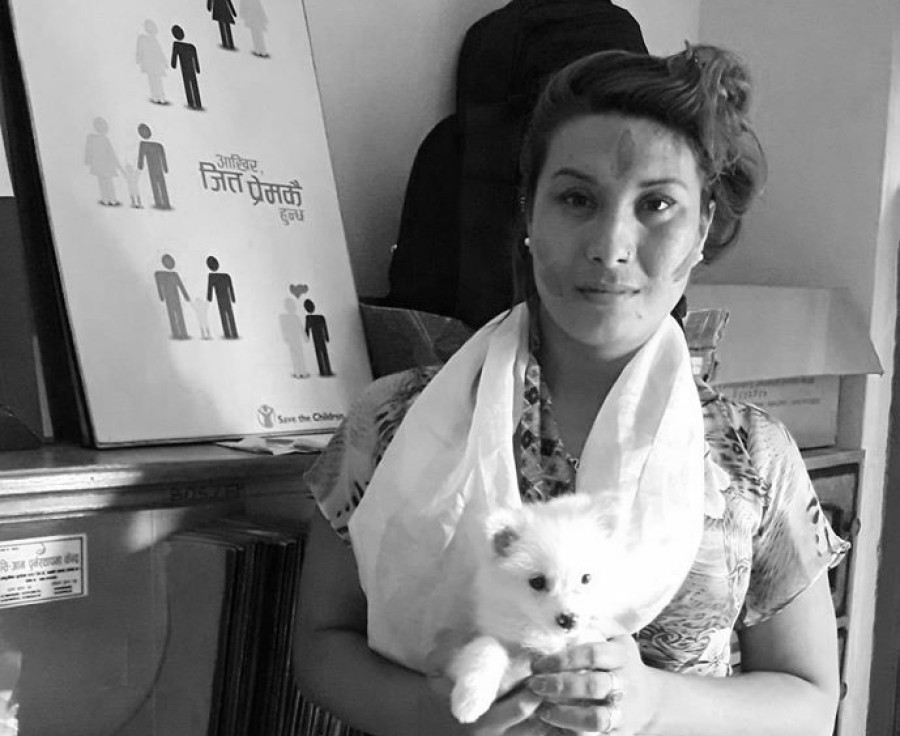National
Murder of transwoman shows that things remain perilous for the LGBTIQ community
Ajita Bhujel’s murder in Hetauda has the trans community concerned for their safety and security.
Shuvam Dhungana
Ajita Bhujel was a carefree and open person who always put her family first. Ever since her parents died when she was a child, Bhujel had been living with her grandparents and when she grew up, she became their sole source of support, both financial and emotional. But Bhujel wasn’t always comfortable in her body. She was 22 years old when she decided to transition from male to female, and although her grandparents were troubled at first, they came to accept her identity as a woman.
But as a transwoman, Bhujel had trouble finding a job. She was forced to resort to sex work so she could keep supporting herself and her elderly grandparents.
Early Saturday morning, at around 4.30, Bhujel’s body was discovered near the Kyampadanda road in Hetauda, naked and beaten to death. She was 29.
“After seeing the dead body, locals immediately contacted the police and when we discovered she was a transgender woman, we contacted the Blue Diamond Society,” Inspector Lagan Prasad Karmi of the Hetauda police told the Post. The Blue Diamond Society is Nepal’s oldest LGBTIQ rights organisation with branches across the country.
When Kiran Thapa, coordinator for the Blue Diamond Society in Hetauda, got a call from the police saying that a transgender woman had been murdered, she went into shock. But she collected herself and began calling everyone from the transgender community in Hetauda. Everyone answered, except for Bhujel. Thapa had known Bhujel for nine years. They were friends.
“She worked as a rights activist in our organisation and we had a very good connection,” said a distraught Thapa, who is also transgender. “She used to call me ‘Aama’ and used to share everything with me.”
Thapa, who immediately went to the site of the murder, described the scene as horrific.
“The body seemed to have been thrown there and she was fully undressed,” she said. “Her gold ring and necklace were both missing. So was her phone.”
Bhujel’s body was brought to Kathmandu for a post-mortem, said Superintendent Sushil Singh Rathour, chief of the Makwanpur District Police Office. “We are interrogating people and trying to find her phone and her call details," he said.
Although police refused to reveal details, Thapa said that the autopsy report showed that she had been raped before being struck on the head with a blunt object and then strangled to death by a wire. Police are uncertain about the motive behind the murder, but queer rights activists are concerned about the motive being a possible hate crime.
Transgender men and women continue to face stigma and prejudice from society at large, which denies them access to traditional means of employment. With few options, they often turn to sex work, which can be dangerous. In March last year, Junu Gurung, a transgender sex worker, was beaten to death.
But as prostitution is illegal in Nepal, they have no legal means of redress when they are mistreated or assaulted by customers. Often, they are doubly victimised by the police.
“The work she was involved in is always dangerous. People misbehave and sometimes, they even attack without reason,” said Pinky Gurung, chairperson of Blue Diamond Society. “If she was not transgender and was not involved in this kind of work, then maybe she would be alive.”
But Gurung said that the motive behind the murder could be financial.
“Nearly a week ago, she had texted me saying she had around Rs 1.2 million as savings that she wanted to build a house with,” Gurung told the Post. “On Friday, she had texted me again saying someone wanted to borrow money from her. I advised her against it and that was our last conversation.”
Hundreds of people from the LGBTIQ community had gathered at the Hetauda police station after learning about Bhujel’s murder.
“The culprit should be behind bars as soon as possible,” said Thapa. “This incident has created fear in our community. We do not feel safe.”
For queer rights activists like Thapa and Gurung, violence against the LGBTIQ community remains a distressing reality. Until the government takes stringent measures to protect marginalised communities, these kinds of incidents will not end, they said.
Bhujel was very well-liked in the community and she had no enemies that anyone can think of. But violence against minority groups can be sudden and extreme, say activists.
Bhujel’s grandparents are distressed at losing their only grandchild, but for now, they are honouring her wishes.
“She always said that she wanted to be dressed like a bride when she died,” said Thapa. “We’re making sure of that.”




 20.12°C Kathmandu
20.12°C Kathmandu















